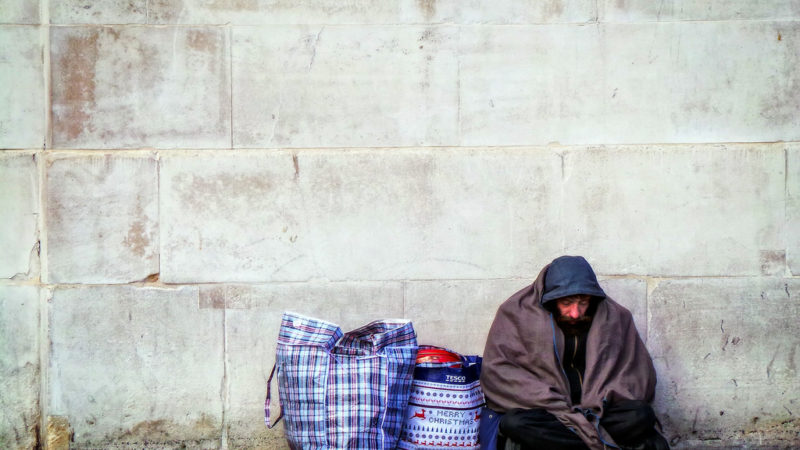"Trying to punish and fine people out of poverty is counterproductive and displays a complete failure to engage with the complex social problems at the heart of this issue."

Human rights charity Liberty is applying for a second review of the decision not to grant legal aid for homeless people targeted by Public Space Protection Orders (PSPOs).
The move is one weapon in its battle against the government’s criminalisation of homelessness. It is also fighting to repeal the law on vagrancy, which results in vulnerable people being persecuted simply for being present in a public space.
Rosie Brighouse, Liberty lawyer, told Left Foot Forward: “While the Vagrancy Act is outdated and anachronistic, and PSPOs are simply not fit for purpose, both are being used to criminalise homeless people.
“Trying to punish and fine people out of poverty is counterproductive and displays a complete failure to engage with the complex social problems at the heart of this issue.”
Late July saw Liberty’s appeal to make legal aid available for a specific challenge to a PSPO issued by the Borough of Poole involving Sarah Ward, who had been homeless, refused.
Kuljit Bhogal, a barrister at Cornerstone Barristers who advises local authorities, has published a statement on the judge’s reasoning.
Bhogal wrote: “A party that wishes to bring a High Court challenge to a PSPO will not be able to apply for legal aid to fund that challenge unless they can show a ‘real, direct and material benefit’ to themselves or a member of their family.
“In addition, they would have to show that the section 66 challenge was within the definition of a ‘judicial review’ found in the funding provisions relating to legal aid.”
Poole’s PSPO came into effect on 16 April 2018. It prohibits begging, leaving unattended personal belongings such as bedding or bags in a designated area or obstructing commercial premises, public buildings, car parks or other public areas. Ward had approached Liberty for help.
Ward argued that although she was not currently homeless, she was a single mother of three children dependent on state benefits and two of her children had disabilities. As recently as 2017 she had been threatened with homelessness; if the challenge was successful it would remove the risk to her and her family.
“Ward also relied on her experience working in homelessness services in Poole for a number of years and considered the criminalisation of the homeless unlawful, misguided and contrary to the interest of local residents of which she was one,” wrote Bhogal.
Legal aid for the challenge was refused, and an appeal launched was dismissed. In dismissing the Liberty appeal, Justice Murray’s ruling held, in part, that elimination of the risk of Ward once again becoming homeless was insufficient.
The benefit must be “real, direct and material for the individual or a member of her family”, Bhogal wrote.
PSPOs come with on-the-spot fines or prosecution and a potential £1,000 penalty if those fines go unpaid. Across the country, councils have used them to target rough sleeping and begging in an attempt to airbrush their streets, according to Liberty.
Liberty is also trying to have the 1824 Vagrancy Act repealed, in partnership with Crisis, Centre Point, Cymorth Cymru, Homeless Link, Shelter Cymru, St Mungo’s and The Wallich. Some 20,000 people have been prosecuted under this act, which is aimed at “the punishment of idle and disorderly persons, rogues and vagabonds”.
Sam Grant, blogging for Liberty, notes: “Beyond the old-fashioned language is the real and cruel effect of prosecuting people for the ‘crime’ of rough sleeping and begging.
“The Act can carry fines of £1,000 with the possibility of criminal records. It traps people in cycles of destitution and criminality. It is the very opposite of a modern and compassionate approach.”
The Act been used to prosecute homosexuality and “living in sin” as well as being the vehicle for discriminatory powers used to harass young black people in the 1970s. Scotland got it right when it abolished the Act entirely in the 1980s. England and Wales are still lagging behind, says Grant.
The Government is currently reviewing the Vagrancy Act, giving us an opportunity to see the back of this law once and for all, says Grant.
Fleur Doidge is a freelance journalist for Left Foot Forward. Follow her on Twitter.
Left Foot Forward doesn't have the backing of big business or billionaires. We rely on the kind and generous support of ordinary people like you.
You can support hard-hitting journalism that holds the right to account, provides a forum for debate among progressives, and covers the stories the rest of the media ignore. Donate today.




6 Responses to “How public space orders and the Vagrancy Act hurt the homeless”
Trevor Collins
Mr. Sacold: “They should be committed to special units so that they can be treated.”
There used to be such institutions, they were called debtors prisons, and workhouses.